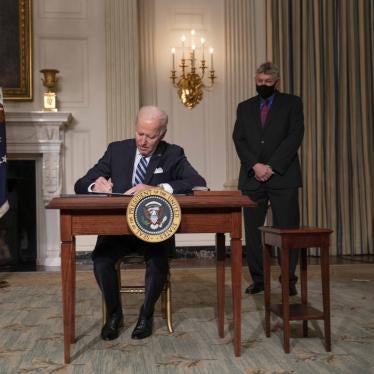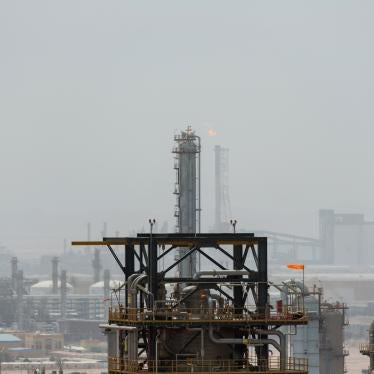In recent weeks, grave concerns have emerged about the conflicts of interest posed by the United Arab Emirates (UAE) as host of the upcoming United Nations Climate Change Conference known as COP28, as well as fears about the safety and security of participants in the deeply repressive petrostate.
It increasingly appears that the UAE, one of the world’s largest oil producers, is seeking to use the conference as a means of burnishing its image while continuing to push the expansion of fossil fuels, undermining efforts to confront the climate crisis and protect human rights.
On January 12, the UAE appointed Sultan Ahmed Al Jaber as president of COP28. He is the CEO of Abu Dhabi National Oil Company (ADNOC) and founded the state-owned renewable energy company Masdar in 2006. The U.S. and EU envoys, John Kerry and Frans Timmermans, quickly endorsed his selection.
The UAE is one of the world’s largest oil producers, and funds from its vast fossil fuel industry provide the majority of the UAE’s government revenue. ADNOC is the government’s foremost fossil fuel company, and recently announced it was expanding all aspects of its operations — despite a growing consensus that there cannot be new oil, gas, or coal development if governments are to meet global climate targets and protect human rights.
Jaber will maintain his role at ADNOC while serving as the UAE’s special envoy for climate change and leading the conference.
The UAE has not been an ally of ambitious and rights-based climate action. The Gulf state sent the largest number of fossil fuel lobbyists as part of its COP27 delegation in Egypt, Global Witness reported, with 70 individuals from within their delegation classified as lobbyists who are either directly affiliated with oil and gas corporations or attending as members of delegations that act on behalf of the oil and gas industry.
In October 2021, an investigation by Unearthed apparently revealed that OPEC, where the UAE is a key member, lobbied to remove references to fossil fuel phaseout from the Intergovernmental Panel on Climate Change’s landmark 2022 report.
The UAE is trying to use COP28 to paint itself as a tolerant oasis of sustainable development and green energy, while continuing to promote the interests of the oil industry and fossil fuels. After the UAE obtained the COP28 presidency it quickly hired a number of expensive U.S. PR firms, apparently to promote its role as host.
The UAE’s record of severe repression and complete closure of the space for free expression, association, and assembly also raises grave concerns about how independent members of civil society can meaningfully participate in the COP28 conference.
The case of a British academic, Matthew Hedges, illustrates the potential perils of hosting COP28 in the UAE. Hedges was detained by UAE security forces in 2018 as he was leaving the UAE following a two-week research trip where he conducted fieldwork for his doctoral thesis.
He was arbitrarily held for months in solitary confinement before he was released under pressure by the UK. On January 13, the Telegraph reported that the UAE has been seeking to smear Hedges’ reputation by circulating a 19-page dossier of private information including a psychiatric report and photographs taken during his imprisonment.
Hedges’ experience is unfortunately common in the UAE, and abuses against Emirati civil society are even more repressive. Scores of activists, academics, and lawyers are serving lengthy sentences following unfair trials on vague and broad charges that violate their rights to free expression and association, without any prospect of release. Ahmed Mansoor, a leading Emirati human rights defender, has been imprisoned in an isolation cell for over six years.
The UAE’s zero tolerance for criticism extends to jailing foreign residents and even people visiting or transiting through the UAE, so it is an open question how UAE authorities will react to civil society criticism of states that are not rapidly phasing out all fossil fuels, an industry vital to the UAE’s economy.
The country will spare no expense during COP28 and will undoubtedly do its best to present a glamorous and green vision of a carbon-neutral future, but the Hedges’ case is a frightening example of what may be in store for anyone who dares to openly criticize and expose the obvious hypocrisy of the Emirati government and push for a phaseout of fossil fuels.









